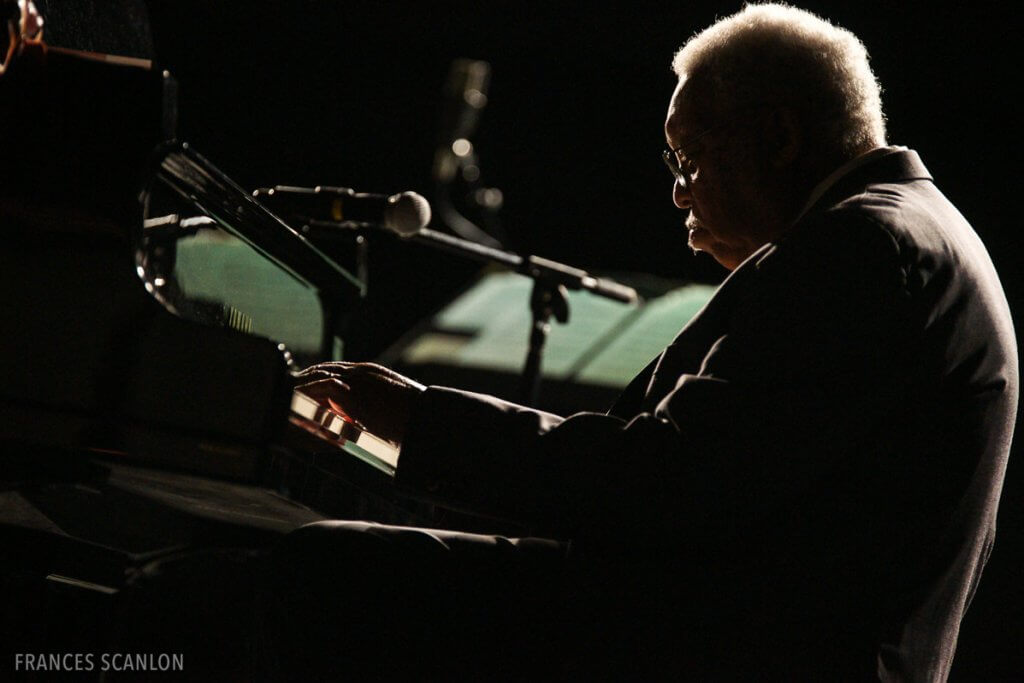Remembering Ellis Marsalis
by Todd Stoll
Reprint by Wynton Marsalis
This has been a tough couple of months for our jazz community. Between extreme economic uncertainty, social and physical isolation, and the passing of a number of beloved figures, it feels like one unbearable thing after another. I do thoroughly believe we will get through this and live to swing another day, but it is important to practice as much generosity as possible with ourselves and others. I am heartened by the stories I hear of artists supporting each other, coming together with resources to help those with less. Once we’re back to something resembling normal, perhaps our humanity will return with a greater focus on love, light, and living. I believe it will.
I’d like to take a moment to remember the great educator and pianist, Ellis Marsalis, patriarch of the most famous family of musicians of our generation, and a beloved figure in his hometown of New Orleans and in many adopted homes throughout the word. He received our LeJENds of Jazz Education award in 2017 at our conference in New Orleans.

I met “E,” as friends and close colleagues called him, nearly 30 years ago when I was a high school music teacher. I quickly fell into a regular habit of talking to him, generally, late at night on the phone. We discussed Duke Ellington, jazz pedagogy, programming for students — it was incredibly inspiring and practical for a young teacher to get information from this man. I fondly remember long calls. Very long calls. Very, very looooong calls. E was a legendary raconteur!
In 1996, I had my first interview with a local newspaper for work I had done with my local youth jazz orchestra. I was nervous and excited, talking to the reporter the day after one of those inspiring and particularly memorable late-night calls. The quote I used, “American music education needs to stop worshipping at the altar of European music…,” was taken directly from E. It was one of those things that probably would have been better received from a more experienced and less brash educator (and it might have needed better context). I received an unbelievable amount of harassment (verbal, written, and this new thing called email…) from friends, colleagues, musicians, and strangers — it was sobering. “So, we should just throw Beethoven out?” “Who do you think you are to tell others what to teach?!” It went on and on. When I called E to tell him about it, he quietly chuckled and said, “Well, now you know.” That was E. I will miss him and know that his legacy lives on in nearly three generations of his students-both in the classroom and on the bandstand. “…a jazz man, with grace and gratitude…”.
Wynton Marsalis has given us permission to re-print his heartfelt tribute to his father:
My daddy passed away last night. We now join the worldwide family who are mourning grandfathers and grandmothers, mothers and fathers, sisters and brothers— kinfolk, friends, neighbors, colleagues, acquaintances and others. What can one possibly say about loss in a time when there are many people losing folks that mean so much to them? One of my friends lost both her mother AND father just last week. We all grieve and experience things differently, and I’m sure each of my five brothers are feeling and dealing in their own way.
My daddy was a humble man with a lyrical sound that captured the spirit of place–New Orleans, the Crescent City, The Big Easy, the Curve. He was a stone-cold believer without extravagant tastes.
Like many parents, he sacrificed for us and made so much possible. Not only material things, but things of substance and beauty like the ability to hear complicated music and to read books; to see and to contemplate art; to be philosophical and kind, but to also understand that a time and place may require a pugilistic-minded expression of ignorance.
His example for all of us who were his students (a big extended family from everywhere), showed us to be patient and to want to learn and to respect teaching and thinking and to embrace the joy of seriousness. He taught us that you could be conscious and stand your ground with an opinion rooted ‘in something’ even if it was overwhelmingly unfashionable. And that if it mattered to someone, it mattered.
I haven’t cried because the pain is so deep….it doesn’t even hurt. He was absolutely my man. He knew how much I loved him, and I knew he loved me (though he was not given to any type of demonstrative expression of it). As a boy, I followed him on so many underpopulated gigs in unglamorous places, and there, in the passing years, learned what it meant to believe in the substance of a fundamental idea whose only verification was your belief.
I only ever wanted to do better things to impress HIM. He was my North Star and the only opinion that really deep down mattered to me was his because I grew up seeing how much he struggled and sacrificed to represent and teach vital human values that floated far above the stifling segregation and prejudice that defined his youth but, strangely enough, also imbued his art with an even more pungent and biting accuracy.
But for all of that, I guess he was like all of us; he did the best he could, did great things, had blind spots and made mistakes, fought with his spouse, had problems paying bills, worried about his kids and other people’s, rooted for losing teams, loved gumbo and red beans, and my momma’s pecan pie. But unlike a healthy portion of us, he really didn’t complain about stuff. No matter how bad it was.
A most fair-minded, large-spirited, generous, philanthropic (with whatever he had), open-minded person is gone. Ironically, when we spoke just 5 or 6 days ago about this precarious moment in the world and the many warnings he received ‘to be careful, because it wasn’t his time to pass from COVID’, he told me,” Man, I don’t determine the time. A lot of people are losing loved ones. Yours will be no more painful or significant than anybody else’s.” That was him, “in a nutshell,” (as he would say before talking for another 15 minutes without pause).
In that conversation, we didn’t know that we were prophesying. But he went out soon after as he lived—-without complaint or complication. The nurse asked him, “Are you breathing ok?” as the oxygen was being steadily increased from 3 to 8, to too late, he replied,” yeah. I’m fine.”
For me, there is no sorrow only joy. He went on down the Good Kings Highway as was his way, a jazz man, “with grace and gratitude.”
And I am grateful to have known him.
– Wynton

